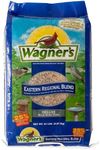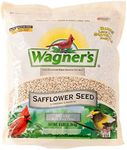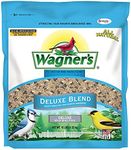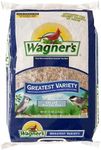Buying Guide for the Best Bird Foods
Choosing the right bird food is essential for the health and happiness of your feathered friends. Different birds have different dietary needs, so it's important to understand what type of food is best suited for the species you are feeding. Additionally, the quality and nutritional content of the bird food can significantly impact the well-being of the birds. Here are some key specifications to consider when selecting bird food, along with explanations to help you make an informed decision.Type of Bird FoodBird food comes in various types such as seeds, pellets, suet, nectar, and insects. Each type caters to different bird species and their dietary preferences. For example, seeds are popular among finches and sparrows, while nectar is ideal for hummingbirds. Understanding the dietary habits of the birds you are feeding will help you choose the right type of food. If you are unsure, a mixed bird food blend can attract a variety of species.
Nutritional ContentThe nutritional content of bird food is crucial for the health of the birds. Look for food that provides a balanced diet, including proteins, fats, vitamins, and minerals. High-quality bird food will list the nutritional content on the packaging. Birds need different nutrients depending on their species, age, and activity level. For example, breeding birds may require more protein, while migratory birds need high-energy food. Choose food that meets the specific nutritional needs of the birds you are feeding.
IngredientsThe ingredients in bird food can vary widely. High-quality bird food will contain natural ingredients without artificial colors, flavors, or preservatives. Common ingredients include sunflower seeds, millet, corn, and various grains. Some bird foods also include dried fruits, nuts, and insects. Check the ingredient list to ensure the food is suitable for the birds you are feeding. Avoid foods with fillers or low-quality ingredients that provide little nutritional value.
Form and SizeBird food comes in different forms and sizes, such as whole seeds, cracked seeds, pellets, and mealworms. The form and size of the food should be appropriate for the bird species you are feeding. Smaller birds may prefer tiny seeds or finely ground food, while larger birds can handle bigger seeds and pellets. Consider the beak size and feeding habits of the birds to choose the right form and size of food.
FreshnessFreshness is important to ensure the food is safe and appealing to birds. Stale or spoiled food can be harmful and may deter birds from feeding. Check the expiration date on the packaging and store bird food in a cool, dry place to maintain its freshness. Buying bird food in smaller quantities can help ensure it stays fresh, especially if you are feeding a small number of birds.
Special Dietary NeedsSome birds may have special dietary needs due to health conditions, age, or breeding status. For example, young birds may require food that is easy to digest and high in protein, while older birds may need food that supports joint health. If you are aware of any specific dietary requirements for the birds you are feeding, look for bird food that addresses those needs. Consulting with a veterinarian or avian specialist can also provide guidance on the best food for birds with special dietary needs.



















